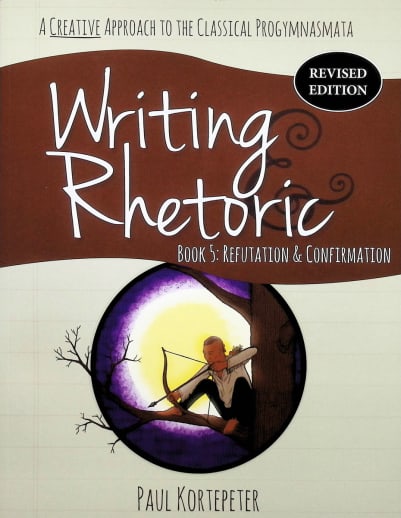This student book includes 12 lessons utilizing fables, historical narratives, and legends. Builds upon previous skills taught in the Chreia and Proverb course and then introduces four-paragraph essays, outlines, comparison and contrast, using quotes to support an argument, delivering writing orally and revising. Lessons teach learners ways to introduce concepts, to engage with the reading selections, and sharpen their expository writing. Concepts also include summarizing and establishing an opinion. Requires the Revised Teacher’s Edition.
Writing & Rhetoric Book 5: Refutation & Confirmation Student revised ed.
Product Overview
- A literature-based approach to refutations
- Mastery-based approach to building argumentation skills
- Develops analytical skills
Description
What's New in the Writing & Rhetoric Book 5 Revised Edition? In this revised edition of Writing & Rhetoric Book 5 (WR5), the illustrations in lesson 5 have been changed to better reflect the content of the chapter. In lessons 7 and 8, the story about which students will be writing their first refutation and confirmation has been changed, as have the exercises and illustrations pertaining to that story. These changes have been made in response to customer feedback regarding the story included in the original edition of the book.
Please note that as a result of these changes, we do not recommend using a combination of original and revised editions, such as the revised edition version 1.0 of the student book (ISBN: 978-1-60051-692-4) with an original teacher’s edition version 1.0 (978-1-60051-276-6). We recommend upgrading to the revised edition version 1.0 for both the student and teacher’s editions. The version number can be found on the copyright page of each book (see example here). Audio files are available for both the original edition and the revised edition of WR5.
A one-semester course for grades 5 or 6 and up
Think of the progymnasmata as a step-by-step apprenticeship in the art of writing and rhetoric. In the Writing & Rhetoric series, author Paul Kortepeter has recovered this proven method of teaching writing in conjunction with critical thinking and speaking. Writing & Rhetoric: Refutation & Confirmation (Student Edition) provides students with forms and models of excellent writing that they will imitate as they progress down the path to masterful writing. This is the fifth in a series of 12 books that will train students over 6 years.
Refutation & ConfirmationA refutation is a short essay that attacks certain parts of a narrative. In this book, students will learn to identify and refute, or criticize, parts of a narrative that are unbelievable, improbable, unclear, or improper. A confirmation is a short essay that defends certain parts of a narrative. When students see parts of a narrative that are believable, probable, clear, or proper, they will confirm them. After learning to identify the parts of a story that can be attacked or defended, students will practice writing refutations or confirmations using sound arguments to explain their opinions.
Be assured that this exercise of refutation and confirmation is not about taking the magic out of stories. On the contrary, it is designed to help students love truly good stories even more because they will think about them more deeply. As students practice refutation and confirmation in this book, they will not only learn to form arguments and express their opinions, but also to find delight in the stories they read.
Students will learn to:
- Write four-paragraph essays
- Outline
- Refute or confirm parts of stories
- Understand comparison and contrast
- Introduce and conclude an essay
- Use narrative to further the purpose of exposition
- Use direct quotes to support an argument
- Deliver writing orally
- Revise writing
This 12-lesson study utilizes fables, historical narratives, and legends from various cultures to teach the Refutation/Confirmation stage of the Progymnasmata. Continuing to build on previous skills of narrative, descriptive and persuasive writing, this one-semester course from Classical Academic Press moves toward persuasive writing, in written and oral forms.
| Product Format: | Paperback |
|---|---|
| Grades: | 5-8 |
| Brand: | Classical Academic Press |
| ISBN: | 9781600516924 |
| Length in Inches: | 11 |
| Width in Inches: | 8.5 |
| Height in Inches: | 0.625 |
| Weight in Pounds: | 1.6 |

